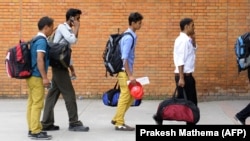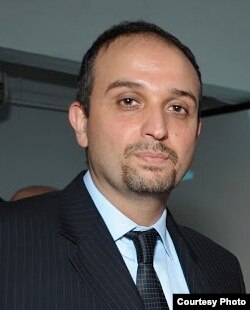WASHINGTON, D.C. —
A proposal by Kuwait’s Ministry of Health to require “medical tests” designed to bar any migrant workers deemed to be homosexual or transgender from entering Kuwait or any other country that belongs to the Gulf Cooperation Council (GCC) is generating intense criticism.
Amnesty International has described the measure as outrageous and called on it to be rejected “out of hand.” Philip Luther, Middle East and North Africa Director at Amnesty International, said the proposal is “an affront to the fundamental right to privacy and underscores the continuing persecution of individuals based on their sexual orientation or gender identity.”
In Kuwait, sexual relations between same-sex consulting adults are illegal, and those convicted under the law can be sent to prison for up to 10 years.
The proposal has alarmed the international gay community, which worries that “gay tests” might be performed on all visitors to Gulf states – including those attending the 2022 World Cup in Qatar. Some groups also worry Kuwait will institute so-called “tests of shame” -- anal and vaginal examinations that have been used by police in Lebanon and elsewhere to determine sexual orientation or virginity. The GCC is made up of Kuwait, Bahrain, Qatar, Saudi Arabia, Oman and the UAE.
Graeme Reid, Director of the Lesbian, Gay, Bisexual and Transgender (LGBT) Rights Program at Human Rights Watch in New York, said while his group is alarmed at the proposal HRW has so far been unable to verify how extensively it will be implemented.
“We have been trying to verify these reports directly with members of Kuwait’s parliament and the people who have apparently made these statements and we have had no success,” he said.
“It is likely that it [the proposed law] is aimed at transgender workers, which would be bad enough in and of itself,” Reid said. “But I think that it has been interpreted to mean that random visitors coming through the airport would be tested for homosexuality, and I don’t think that is what is being said.”
Although Kuwait’s health department officially recognizes Gender Identity Disorder, parliament passed a law in 2007 banning “imitating the opposite sex.” Rights activists say this paved the way for the physical, sexual and emotional abuse of transgender individuals by both police and public.
The 2012 HRW report “They Hunt Us Down for Fun” details how people in Kuwait can be arrested for anything from “wearing a feminine watch” to having too soft a voice or complexion. Detainees may be subjected to bodily inspection by doctors.
“It shows a real anxiety,” said Reid, “about gender nonconformity in Kuwait.”
Reid said that up until a few years ago, transgender individuals had a somewhat hostile “but joking” relationship with police in Kuwait. “It wasn’t violent and abusive in the way that it became after the passage of the law.”
Who will be tested?
Kuwaiti lawmakers who back the proposal said they are seeking to identify and ban persons of the “third sex,” a non-medical catch phrase used regionally to describe transgender or intersex individuals, cross-dressers, eunuchs, gays and lesbians.
“The problem is that these guys are on a witch hunt without knowing what, exactly, they are chasing,” said Hossein Alizadeh, the Middle East and North Africa Program Coordinator with the International Gay and Lesbian Human Rights Commission.
“There are huge misconceptions about gender and sexuality in most of these countries, and this misinformation informs the policies of these countries. Using the term ‘third gender’ and then also using the term ‘homosexual’ means that they really don’t know what they are talking about. And if you don’t know what you are looking for, what kind of test are you going to use?” Alizadeh said.
He said while the proposal is misguided it’s not likely to affect casual visitors. “Kuwaiti officials have made it very clear that the proposed law would not target tourists, especially anyone from the global North.”
According to Alizadeh, the policy targets only those applying for work from specific countries of origin, as listed on the GCC Health Council website – which he said does not make the testing any less discriminatory.
“You are applying this kind of law to citizens to citizens of certain countries, to a very specific class of laborers who are in need of financial resources and are more vulnerable,” Alizadeh said.
The testing proposal has the support of the director of the GCC Health Ministers Council, Tawfiq Khojah, who told Arab News that if the proposal is approved, testing will become mandatory at 289 health centers across the GCC, and that testing is necessary to help “preserve Islamic principles.”
Anger over “interference” in Kuwait
Kuwaiti lawmakers have slammed what they call interference by Amnesty International. M.P. Abdurrahman Al-Jeeran said the matter is “sovereign” and urged the rights group to “pay attention to the noble goals it was established for,” and stop defending what he described as “deviants.” Former MP Mohammad Al Hayef accused the rights group of encouraging “behavior that is against human nature.”
According to Amnesty International the proposal will be debated at a meeting of the GCC Central Committee for Expatriate Labor Forces in Oman on November 11. The committee sets migration policies in the region and if the proposal passes gender testing will become mandatory in all six GCC member states.
Amnesty International has described the measure as outrageous and called on it to be rejected “out of hand.” Philip Luther, Middle East and North Africa Director at Amnesty International, said the proposal is “an affront to the fundamental right to privacy and underscores the continuing persecution of individuals based on their sexual orientation or gender identity.”
In Kuwait, sexual relations between same-sex consulting adults are illegal, and those convicted under the law can be sent to prison for up to 10 years.
The proposal has alarmed the international gay community, which worries that “gay tests” might be performed on all visitors to Gulf states – including those attending the 2022 World Cup in Qatar. Some groups also worry Kuwait will institute so-called “tests of shame” -- anal and vaginal examinations that have been used by police in Lebanon and elsewhere to determine sexual orientation or virginity. The GCC is made up of Kuwait, Bahrain, Qatar, Saudi Arabia, Oman and the UAE.
Graeme Reid, Director of the Lesbian, Gay, Bisexual and Transgender (LGBT) Rights Program at Human Rights Watch in New York, said while his group is alarmed at the proposal HRW has so far been unable to verify how extensively it will be implemented.
“We have been trying to verify these reports directly with members of Kuwait’s parliament and the people who have apparently made these statements and we have had no success,” he said.
“It is likely that it [the proposed law] is aimed at transgender workers, which would be bad enough in and of itself,” Reid said. “But I think that it has been interpreted to mean that random visitors coming through the airport would be tested for homosexuality, and I don’t think that is what is being said.”
Although Kuwait’s health department officially recognizes Gender Identity Disorder, parliament passed a law in 2007 banning “imitating the opposite sex.” Rights activists say this paved the way for the physical, sexual and emotional abuse of transgender individuals by both police and public.
The 2012 HRW report “They Hunt Us Down for Fun” details how people in Kuwait can be arrested for anything from “wearing a feminine watch” to having too soft a voice or complexion. Detainees may be subjected to bodily inspection by doctors.
“It shows a real anxiety,” said Reid, “about gender nonconformity in Kuwait.”
Reid said that up until a few years ago, transgender individuals had a somewhat hostile “but joking” relationship with police in Kuwait. “It wasn’t violent and abusive in the way that it became after the passage of the law.”
Who will be tested?
Kuwaiti lawmakers who back the proposal said they are seeking to identify and ban persons of the “third sex,” a non-medical catch phrase used regionally to describe transgender or intersex individuals, cross-dressers, eunuchs, gays and lesbians.
“The problem is that these guys are on a witch hunt without knowing what, exactly, they are chasing,” said Hossein Alizadeh, the Middle East and North Africa Program Coordinator with the International Gay and Lesbian Human Rights Commission.
“There are huge misconceptions about gender and sexuality in most of these countries, and this misinformation informs the policies of these countries. Using the term ‘third gender’ and then also using the term ‘homosexual’ means that they really don’t know what they are talking about. And if you don’t know what you are looking for, what kind of test are you going to use?” Alizadeh said.
He said while the proposal is misguided it’s not likely to affect casual visitors. “Kuwaiti officials have made it very clear that the proposed law would not target tourists, especially anyone from the global North.”
According to Alizadeh, the policy targets only those applying for work from specific countries of origin, as listed on the GCC Health Council website – which he said does not make the testing any less discriminatory.
“You are applying this kind of law to citizens to citizens of certain countries, to a very specific class of laborers who are in need of financial resources and are more vulnerable,” Alizadeh said.
The testing proposal has the support of the director of the GCC Health Ministers Council, Tawfiq Khojah, who told Arab News that if the proposal is approved, testing will become mandatory at 289 health centers across the GCC, and that testing is necessary to help “preserve Islamic principles.”
Anger over “interference” in Kuwait
Kuwaiti lawmakers have slammed what they call interference by Amnesty International. M.P. Abdurrahman Al-Jeeran said the matter is “sovereign” and urged the rights group to “pay attention to the noble goals it was established for,” and stop defending what he described as “deviants.” Former MP Mohammad Al Hayef accused the rights group of encouraging “behavior that is against human nature.”
According to Amnesty International the proposal will be debated at a meeting of the GCC Central Committee for Expatriate Labor Forces in Oman on November 11. The committee sets migration policies in the region and if the proposal passes gender testing will become mandatory in all six GCC member states.






